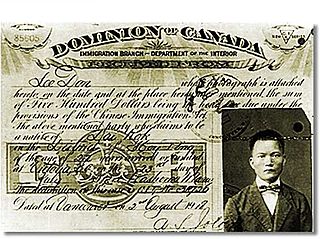Metis or Métis may refer to:
Malaya refers to a number of historical and current political entities related to the Malay Peninsula in Southeast Asia.
A suit is a set of garments with matching pieces, typically a jacket and trousers.
Chinese Canadians are Canadians of full or partial Chinese ancestry which includes Canadian-born Chinese. They comprise a subgroup of East Asian Canadians which is a further subgroup of Asian Canadians. Demographic research tends to include immigrants from Mainland China, Hong Kong, and Macau, as well as overseas Chinese who have immigrated from Southeast Asia and South America into the broadly defined Chinese Canadian category.
Seventeen or 17 may refer to:

The Chinese head tax was a fixed fee charged to each Chinese person entering Canada. The head tax was first levied after the Canadian parliament passed the Chinese Immigration Act of 1885 and it was meant to discourage Chinese people from entering Canada after the completion of the Canadian Pacific Railway (CPR). The tax was abolished by the Chinese Immigration Act of 1923, which outright prevented all Chinese immigration except for that of business people, clergy, educators, students, and some others.
Haha is an onomatopoeic representation of laughter.

In 1942, internment of Japanese Canadians occurred when over 22,000 Japanese Canadians, comprising over 90 percent of the total Japanese Canadian population, from British Columbia were forcibly relocated and interned in the name of national security. The majority were Canadian citizens by birth. This decision followed the events of the Japanese invasions of British Hong Kong and Malaya, the attack on Pearl Harbor in Hawaii, and the subsequent Canadian declaration of war on Japan during World War II. This forced relocation subjected many Japanese Canadians to government-enforced curfews and interrogations, job and property losses, and forced repatriation to Japan.
Turnover or turn over may refer to:
Bingo or B-I-N-G-O may refer to:
Red Dress or The Red Dress may refer to:
Option or Options may refer to:
Japanese Canadians are Canadian citizens of Japanese ancestry. Japanese Canadians are mostly concentrated in Western Canada, especially in the province of British Columbia, which hosts the largest Japanese community in the country with the majority of them living in and around Vancouver. In 2016, there were 121,485 Japanese Canadians throughout Canada.
The Sumatran expeditions can refer to:
This page is based on this
Wikipedia article Text is available under the
CC BY-SA 4.0 license; additional terms may apply.
Images, videos and audio are available under their respective licenses.

